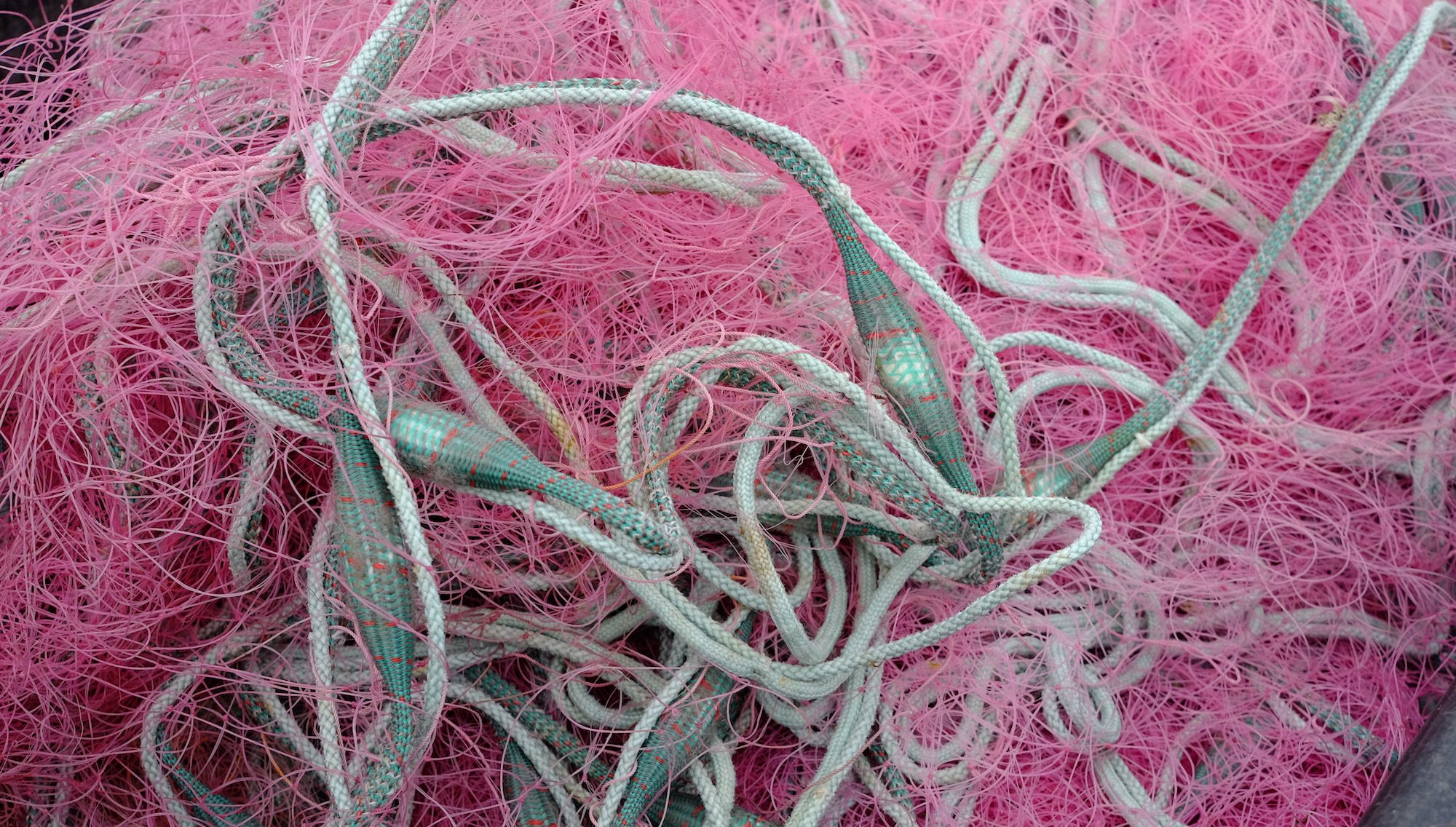Anja
Hi friends of the Plastisphere, this is Anja Krieger, the creator and host of this podcast. I’ve got some personal news to share with you before we begin this episode. Last summer, I left freelance journalism to take on a new role as a science editor in climate communications. It’s a wonderful and rewarding position, but it’s also full-time, which means there’s not that much time for this podcast anymore. But since this show has always been a passion project, I will try to keep it running, and bring you more stories on plastics, people and the planet whenever I can.
Today, I’ve got an especially hopeful one to share. Just a few days ago, the United Nations Environmental Assembly decided to start negotiations on a global treaty to tackle plastic pollution. It’s a story my co-producer Brooke Bauman and I have been following for a while. In this episode, we are drawing from Brooke’s own podcast series and tying in updates on this historic decision and its context in the ways we currently handle waste. So without further ado, I hand over to Brooke, who’ll tell you the story.
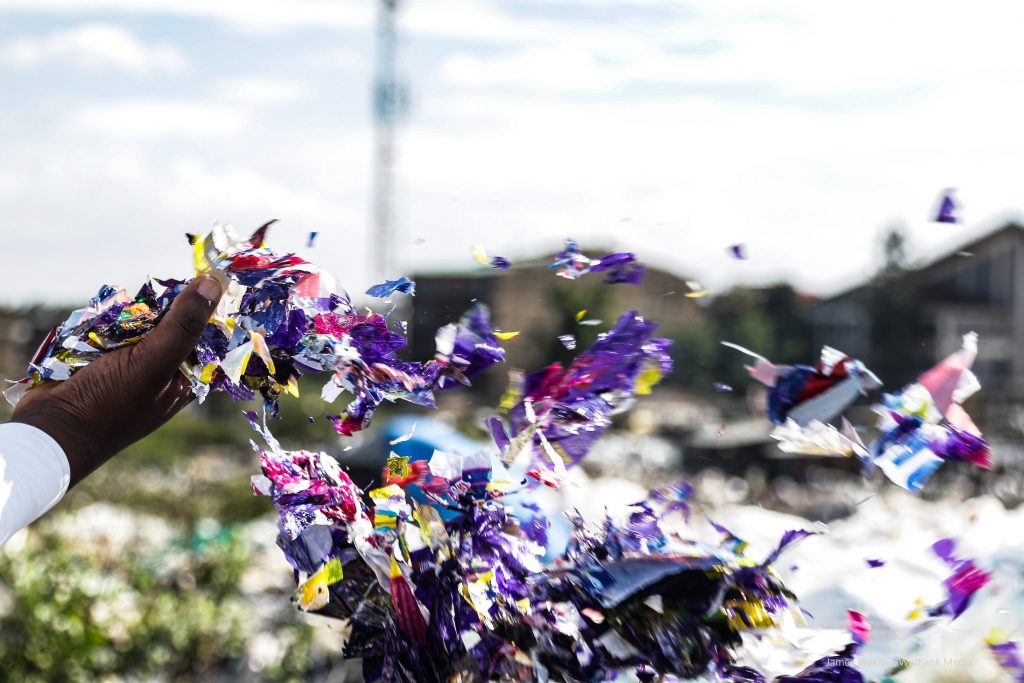
Music – Lemon and Melon by Blue Dot Sessions
Brooke
When you hear news for the first time that shakes up your world, you can usually remember the place you were. I can clearly picture the lunch break in 2018 when my friend paused from scrolling through the news on her phone and showed me an article explaining China would no longer accept much recycling from the United States. Later that day, I consulted Google and sure enough, across the country, facilities were having difficulties processing recycling without China’s open doors. It took me by surprise. How could recycling not work in an industrial country like the U.S.? As a kid, I was confident that a water bottle thrown into my blue recycling bin would get a second life as a new plastic product. I thought the loop would go on forever. But I have learned it’s not that simple. The truth is, we’ve used recycling as an excuse to keep over-consuming, and now we’re just passing the burden to other countries.
Brooke
Welcome to Plastisphere, the podcast on plastics, people, and the planet. My name is Brooke Bauman, and I’ll be your host. In this episode, we’ll explore recycling, incineration, waste exports, and the road toward a global plastics treaty – as well as how all of that relates to environmental justice. To learn more about this topic, I reached out to Alexis McGivern. Alexis is a researcher and conservationist who has been working on the plastic issue for several years.
Alexis McGivern
China in 2018 basically announced a ban on a number of different types of waste imports, citing that they had increasing amounts of waste contamination in the imports that they were receiving, so that means a lot of waste contamination not only with different types of plastic but with different types of waste…and yeah, essentially, that a lot of it was, well, because of this contamination of waste, was basically being dumped, because it was cheaper to be dumped than it was to be recycled, because they weren’t receiving the right type of waste. And so there were a lot of concerns about human health impacts and also about pollution in the countryside in China.
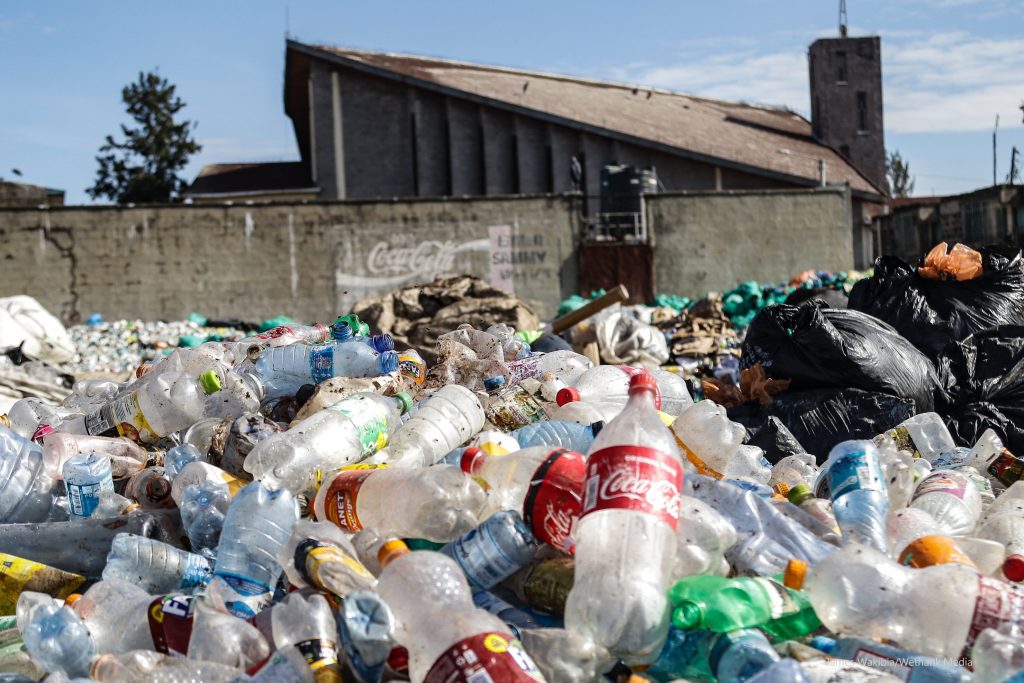
Brooke
You may have heard that on a global level, staggeringly little plastic is actually recycled. According to one estimate, only 9 percent of all plastic produced since 1950 has made it into a new product. And it’s often not the closed loop we’re dreaming of. According to data from 2013 published by the Ellen MacArthur Foundation, only a tiny fraction of plastic packaging waste was recycled into products with the same function – just two percent! The rest of the material was “downcycled” to something of lower quality. So recycling is much more linear than the circular symbol it’s associated with.
Ambi 1 in background
Brooke
To understand what exactly is going on with recycling in my own country, I visited a recycling facility in Raleigh, North Carolina. It’s owned by the packaging giant Sonoco, which has about 300 operations around the world in 34 countries.
The facility looked like a warehouse. On one side of the room, the finished waste was sorted by type. On the other side, there were people and automatic machines sorting through waste as it came down a huge conveyor belt.
The Field Procurement Manager at Sonoco showed us around. He said the company commonly runs into problems with plastic bags, food waste, and sometimes even twinkly string lights from holiday decorations. He explained that when people try to recycle things that can’t be recycled, they contaminate the waste stream. This slows down production because the workers have to remove the contaminants.
Brooke
Even if you aim for perfection and only put clean and recyclable things into your bin, it doesn’t mean your trash will get a new life. To justify your effort, the materials must be sold to companies to properly process and re-use them. But when there isn’t enough market demand for some of these plastics or they are too difficult to separate, recycling often turns into mere “wish-cycling”. In other words, it isn’t really happening. And now that China has closed its doors to recycling imports, some of the cheapest, dirtiest plastic trash is exported to South-East Asia instead.
Music – Daymaze by Blue Dot Sessions
Alexis McGivern
Waste colonialism for me is really the export of waste from developed to developing countries. Much like sort of a reversed pattern of how colonialism removed the most valuable resources from developing countries and shipped them to developed countries. We’re sort of seeing the reverse now where we’re consuming so much in the developed world, in high and upper middle income countries, that we genuinely have no space and no capacity for the amount of waste that we’re producing.
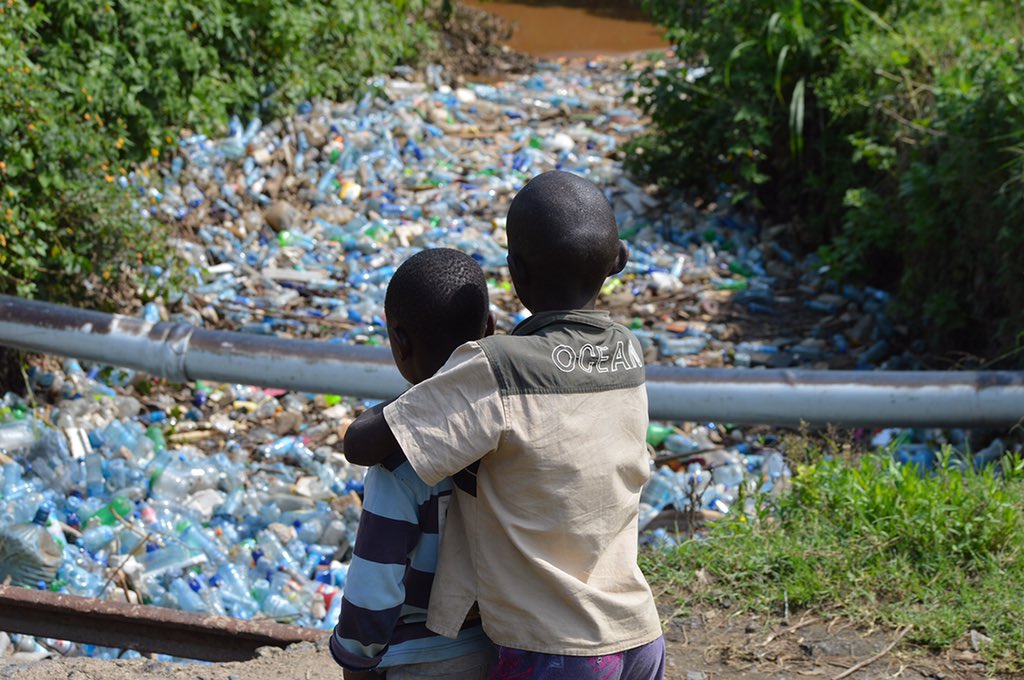
Brooke
There’s a growing field of study that explores the global patterns of waste shipment and discarding in the context of colonial history, called waste colonialism. From reading the work of Dr. Max Liboiron from Memorial University of Newfoundland, Alexis became more conscious about the realities of waste colonialism in the worldwide trade of discarded plastics.
Alexis McGivern 4
The cheapest and easiest solution is to ship that to China, to Vietnam, to Thailand, to various places around the world where not only it is affecting the health and the nature of these countries, but also we’re shipping waste to these countries knowing full well that they do not have the capacity to deal with this amount of waste and all these different types of waste.
Brooke
At the time of China’s ban on imports in early 2018, Alexis was working for the International Union for Conservation of Nature, sponsored by the Gallifrey Foundation.
Alexis McGivern
In the NGO community, we really felt that this was sort of the time that, you know, countries like the US or the United Kingdom or Canada or any host of European countries who have been a part of this waste colonization for a long time would have to invest in domestic resources to deal with their waste infrastructure. But instead what we saw was the diversion of waste into other countries like Vietnam and Thailand the sort of the number 1 and 2 biggest imports who have been accepting the flow of waste that was previously going to China.
Music 3 – Greylock by Blue Dot Sessions
Brooke
China’s import ban rerouted the waste exports. Other countries in South-East Asia started to receive more and more of the plastic that China did not want. But soon, they too started to shut their doors. Vietnam got so congested it closed its ports for plastic and paper scraps. Cambodia sent 83 shipping containers full of rubbish back to the United States and Canada. Malaysia returned 150 containers of illegally imported plastic waste to their countries of origin. And politics were starting moving ahead also. In 2019, the Basel Convention was amended to include plastic waste. It controls the transboundary movements of hazardous wastes and their disposal. Starting in 2021, international shipping of plastic waste scrap needed the written consent of all transit and importing countries. The business of waste exports turned upside down. But it still causes trouble. Last summer in Thailand, over a hundred civil society organizations expressed concern about the amount of plastic trash that’s still coming in.
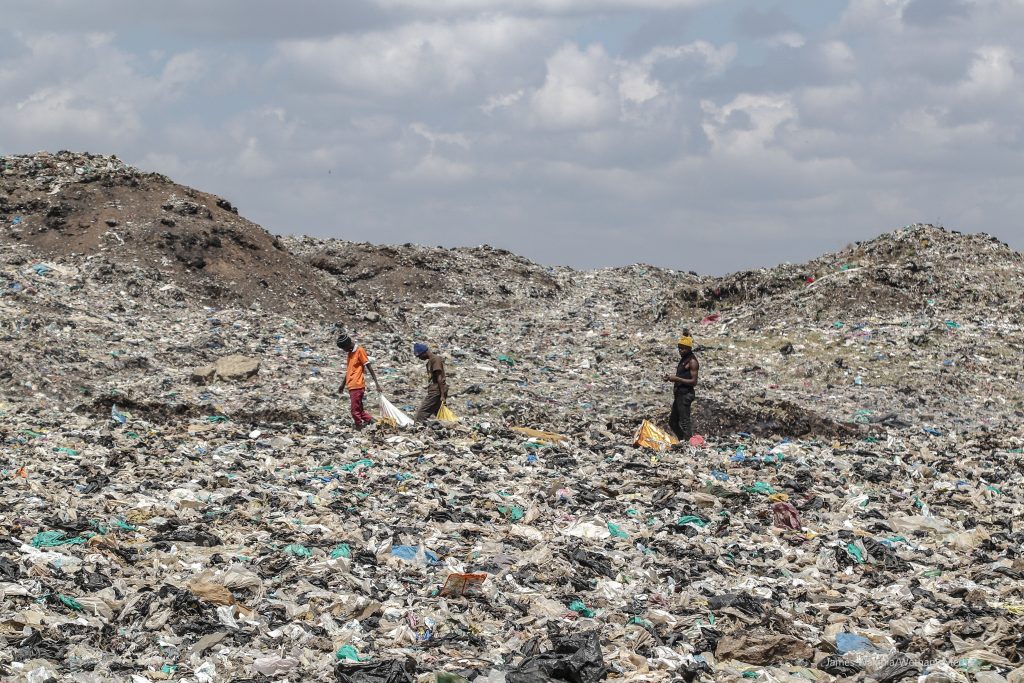
Brooke
Since plastic pollution moves across a global scale, the United Nations plays a key role in governing it. The United Nations Environment Assembly, or UNEA, first flagged marine and microplastic pollution in 2014 as an emerging threat that they needed to address. When delegates met again in Nairobi, Kenya, a few years later, they discussed three possible futures on what they saw moving forward:
Alexis McGivern
So one was the Status Quo, so doing nothing and working as…living as we are now. The second was a modification of the current agreements that are dealing with plastic to sort of strengthen them. And the third scenario was a completely new global convention on plastic.
Brooke
In 2017, delegates took a critical look at the effectiveness of existing global and regional governance strategies. It turned out that none of these approaches would be able to solve the issues with plastic pollution. So they started to debate on what to do next. Alexis explained to me that there are some wild dynamics at play at the UNEA meetings – because every representative group has an agenda they’ve come to promote.
Alexis McGivern
You know essentially we have developing countries who are asking for stricter controls, who are asking for binding agreements, who are the people who are really on the frontlines of seeing what plastic pollution…how plastic pollution is affecting their people, and their biodiversity, and their countries. So you have developing countries, you have NGOs, who are concerned with a wide range of issues of plastic pollution, from climate change to social justice issues to environmental racism to biodiversity issues. Of course, you have IUCN there representing, sort of the marine biodiversity concerns that we have. And so, the whole range of issues, which is why NGOs are calling for stricter controls. And then, in total opposition to that you have industry who are very much downplaying the issues, who are saying even just through their language, that it’s a marine litter issue. And the word ‘litter’ is controversial because it sort of implies that the only reason why garbage is a problem is that it’s litter, because people throw it on the street, because it’s misplaced. Whereas, you know, NGOs and a lot of others say, that you know the waste shouldn’t be there, to be created in the first place. Saying it’s ‘litter’ really puts the onus on the consumer rather than the people who are producing it.
Music– Lead Shroud by Blue Dot Sessions
Brooke
When Alexis attended the prep meetings for the fourth United Nations Environmental Assembly as a spectator, she spent most of her time among the nongovernmental organizations. These activists organized around a cause and were driving a shift in the public perspective of plastic. From 2016 to 2018 the issue really rose to the surface. The United Nations world environment day was dedicated to beating plastic pollution. Media outlets like the National Geographic started to report more frequently on the issue. Things started to gain traction.
Alexis McGivern
It’s really great to watch an issue go from being a complete niche issue that nobody really cares about to something that everybody is talking about, you know, that there’s headlines almost every day in major newspapers about the plastics crisis and people…just, all of it becoming more mainstream is just an amazing thing to watch. So that was one thing that was really incredible to watch for the people working on it, how public opinion on plastics has shifted. And I think in plastics in particular, people are putting a lot more pressure on their elected officials, to really do something about it. I really got the sense when we were there that people couldn’t just brush this under a rug. It’s not an issue that people will stop caring about and it’s not an issue that people are gonna stop seeing, so in some ways there’s a lot more accountability.
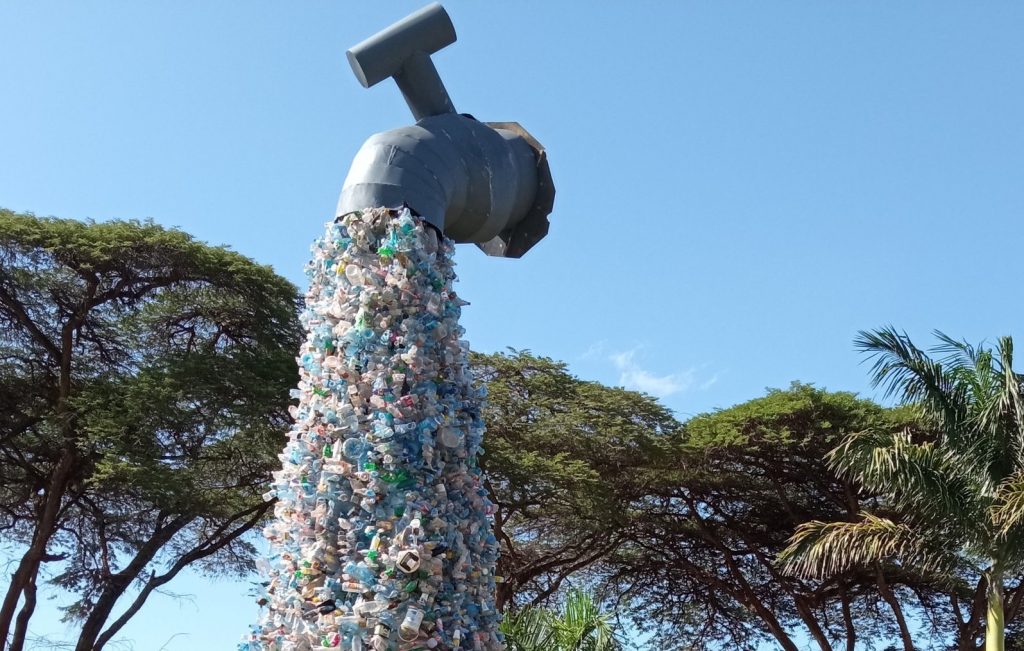
Brooke
But back when Alexis attended the meetings, some representatives at UNEA were reluctant to advocate for a bold plastics treaty. So what held them back?
Alexis McGivern
I was pretty concerned with how much a lot of countries just seemed to be playing complete lip service to the idea of a global convention or supporting it just enough so that they couldn’t say that they specifically derailed the discussion or voted against it, but really working to water it down under the guise of ‘we should really support industry initiatives, they’re working really hard, and we don’t wanna discourage them from the great efforts that they’ve done so far.
Brooke
Obviously, there were some conflicting interests. Alexis also noted that the conversation was focused mostly on the environmental impacts of plastic pollution in the oceans. It was an issue close to her heart, but she knew there was something missing.
Alexis McGivern
I found it surprising how it was really a few very vocal NGO members who were really bringing it back to this environmental justice or environmental racism issue. And there was so much discussion of whales and turtles and so little discussion of people who are on the frontlines, who are suffering from plastic being dumped near their homes or plastic being openly burned near where they live, affecting air quality, affecting water safety and things like that.
Music 6 – The Summit by Blue Dot Sessions
Brooke
When I interviewed Alexis three years ago, plastic pollution was just starting to move beyond its label as a marine litter issue. A global convention on plastics seemed far away back then, and the human impacts of plastics production and disposal were almost never discussed. Alexis got to see them first hand. She told me how she once traveled to the Maldives to do education and outreach projects on waste with the International Union for Conservation of Nature. The Maldives is a nation of over 1,000 islands in the Indian Ocean. On the weekends, Alexis traveled around the archipelago.
Alexis McGivern
One of the ways that they deal with waste is through the boat networks that they have, connecting these different islands. So they’ll carry waste into different main islands depending on what’s the biggest main island in the area. So for the capital island, Malé, there’s an island nearby that is called Thilafushi which is sort of known as garbage island or rubbish island.
Brooke
Thilafushi is the final destination for the waste produced in the city of Malé, one of the most densely populated places on Earth. During her stay, Alexis visited the trash island several times.
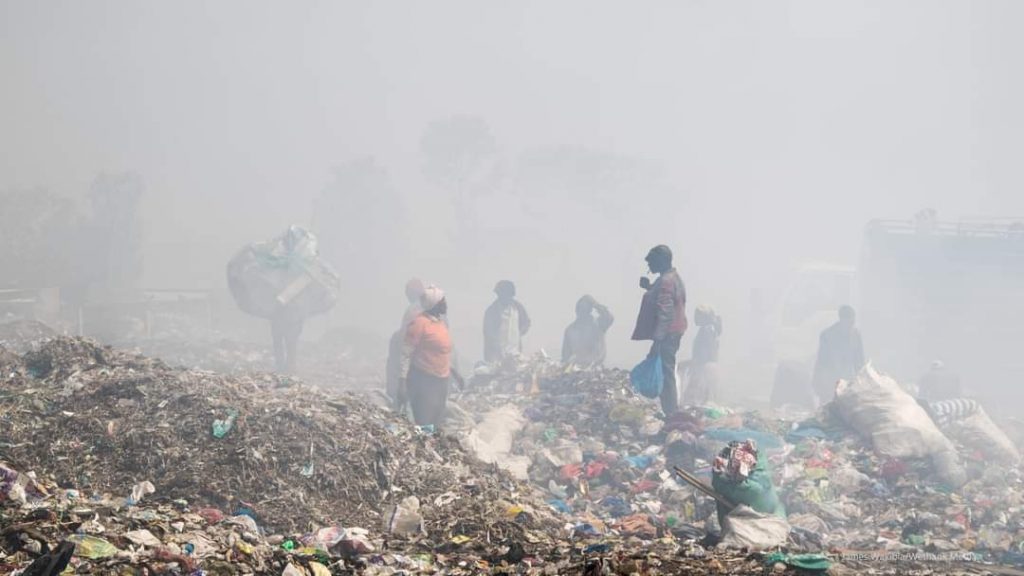
Alexis McGivern
I grew up in Switzerland where we have a lot of mountains, and I just come from there. And as I was walking towards the island I saw this line in the horizon which I thought, oh it’s just mountains, you know, oh mountains on the horizon. And then I saw that it was just garbage, just piles of garbage. That was also a really crazy moment where I was like thinking like, you know, all the things that I’m using while living in Maldives, they’re ending up here. And you know, we throw things away but they just get transported a 15-minute boat ride away and we don’t see them again.
Brooke
The conditions for workers on trash island were concerning to Alexis.
Alexis McGivern
The Maldives employs Bangladeshi workers to work on this island, to basically go around and set piles of trash on fire in order to sort of make more space for new incoming shipment. And that has also to do with this sort of this internal class and hierarchy, basically, between Maldivians and Bangladeshis – they’re no Maldivians working on this island because it’s not really deemed a Maldivian job. And so these people who are working there with no safety equipment, no masks, no gloves, and dealing with waste that’s coming in from tourist islands where people are spending, you know, 500 Dollars a night to stay in a beautiful bungalow and enjoy the untouched Maldives. It just speaks to a lot of injustice.
Music 7 – Then a Gambling Problem by Blue Dot Sessions
Brooke
Open burning is one of the easiest and most toxic ways to get rid of plastic waste. Alexis explained to me that waste incineration is a critical environmental justice issue – not only in the Maldives, but also on a global scale. Similar to recycling, incineration is another waste management infrastructure that seems simpler than it actually is. What appears to be a magical disappearance of waste can be an entangled mess of human rights and labor violations, toxic emissions and uneven burdens of second-hand pollution. Could there be an alternative? I spoke about this with Claire Arkin, who works in Communications for the Global Alliance for Incinerator Alternatives or GAIA.
Claire Arkin
GAIA is a global network of grassroots groups and individuals who are working towards a just and toxic-free world where garbage is not burnt, where people don’t suffer the impacts of pollution from waste. And a lot of our members are working towards zero waste systems in their communities as well as blocking incinerator projects from coming through and shutting down the incinerators that are polluting the environment and threatening peoples’ health.
Brooke
For the past two decades, GAIA has connected groups around the world who are working toward these goals: Zero waste activists, waste picker cooperatives, recycling and waste management experts, and people who speak out for environmental justice. Of course, each place has its own specific challenges and the same solution can’t be transplanted everywhere.
Claire Arkin
We try to find commonalities in different struggles and different successes. You know, oh, this piece of legislation worked in this particular community, you might wanna check it out in this community. You know, this tactic to fight an incinerator proposal worked in a community in this region – and you might want to try it in your community where you’re facing a similar struggle.
Brooke
What happens when these initiatives try to eliminate incineration from the lifecycle of plastic waste? Why is this attention to infrastructures important? To answer these questions, we have to back up a few steps.
Music 8 – Building the Sled by Blue Dot Sessions
Brooke
Once we’ve disposed of single-use plastics, they can go one of three official routes: landfill, incineration, or recycling. Landfilling can potentially contaminate the water supply for nearby communities, which are often low-income or minority communities. Also, landfills produce methane when bacteria break down the organic matter. Recycling, as we’ve discussed, isn’t always feasible when markets are down, and it hasn’t really proven to work efficiently in the past. So then there’s incineration, which has the worst climate impact because it produces a lot of greenhouse gasses. In addition to that, the workers and nearby communities can also be exposed to toxic metals, organic substances, acid gasses, and other toxic substances, as the Center for International Environmental Law reports.
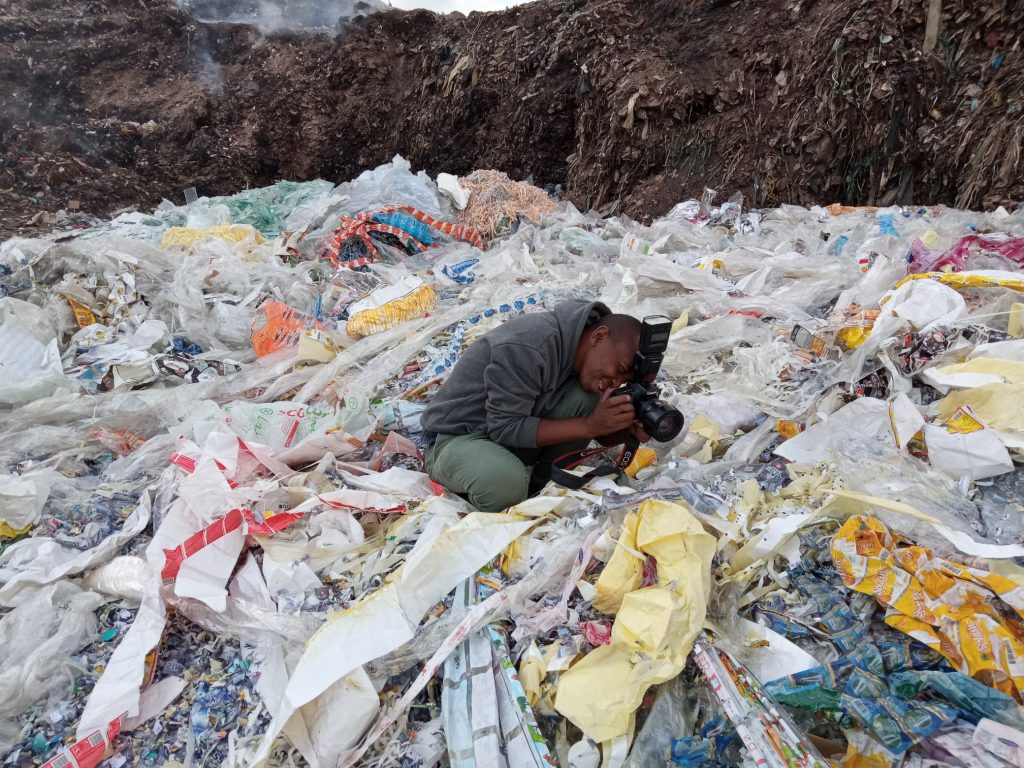
Claire Arkin
Environmental justice is where basically communities are disproportionately impacted by environmental degradation. So, for example, communities living in Baltimore, or Detroit, or Long Beach, California, who had to breathe in pollution often from other communities’ garbage that was shipped over or trucked into these incinerator facilities. And that’s injust, that’s not fair. People shouldn’t have to breathe in pollution from other people’s garbage. So these communities are rising up and are saying no, and we aim to support them as much as we can.
Brooke
So incineration can be harmful to human health and also contribute to climate change. Additionally, incineration generates toxic ash as a byproduct, which needs to be stored in special facilities, almost like nuclear waste.
But for business as usual, it does have advantages. Burning waste clears space in landfills and in some cases, it’s even possible to recover the heat and generate steam or electricity. Of course, from open burning to huge incineration plants in cities, there are many types of incinerators. Modern incinerators can have better controls and filters that lower their emissions. But to Claire and her peers, more incineration can never be the goal.
Claire Arkin
Incineration is not the solution, and we really need to reduce the amount of plastics that we put into the world. There’s just such an out-of-control plastics production going on, and we’re seeing that the production is going to be ramping up significantly in the coming decades if we don’t intervene. So people are really calling out the fact that plastic isn’t just a waste management issue. It goes more upstream than that. We need to really stop plastic pollution at the source. We need to stop making so much plastic, and we should not be pointing the finger at countries in the Global South who we dump this plastic pollution on.
Brooke
Claire hopes that by re-imagining our systems, separating and reducing our waste and inspiring policy change, we can start to move toward a less-waste, or even zero-waste society.
Claire Arkin
We always describe zero waste as a journey. And zero waste looks different in different places. You know, the regional contexts are really important. Because the waste stream looks different in different parts of the world. Some places, particularly in the Global South, a lot of the waste stream is made up of organics, whereas in places like the U.S., there’s more plastic waste, non-biodegradable waste. So that means that the strategies that we would use to get to Zero Waste would be different. And we want to uplift and amplify those solutions so that other areas have more of a blueprint of, oh, this is how we can get to zero waste.
Music 9 – FasterFasterBrighter by Blue Dot Sessions
Brooke
Eight years after first flagging plastic pollution as an issue, the United Nations Environment Assembly met in March 2022. Delegates from 175 nations came together to agree on a mandate to put together a global plastics treaty within the next two years.
Ahead of the talks, representatives of the chemical and plastics industries tried to influence decision makers to prevent the treaty from capping plastics production. But despite the lobbying behind the scenes, the main elements of a draft for a strong resolution, handed in by Rwanda and Peru, prevailed. Some have called it a ‘historic’ decision, and Secretary-General of the UN António Guterres tweeted that it’s “the most important deal since the Paris Agreement”.
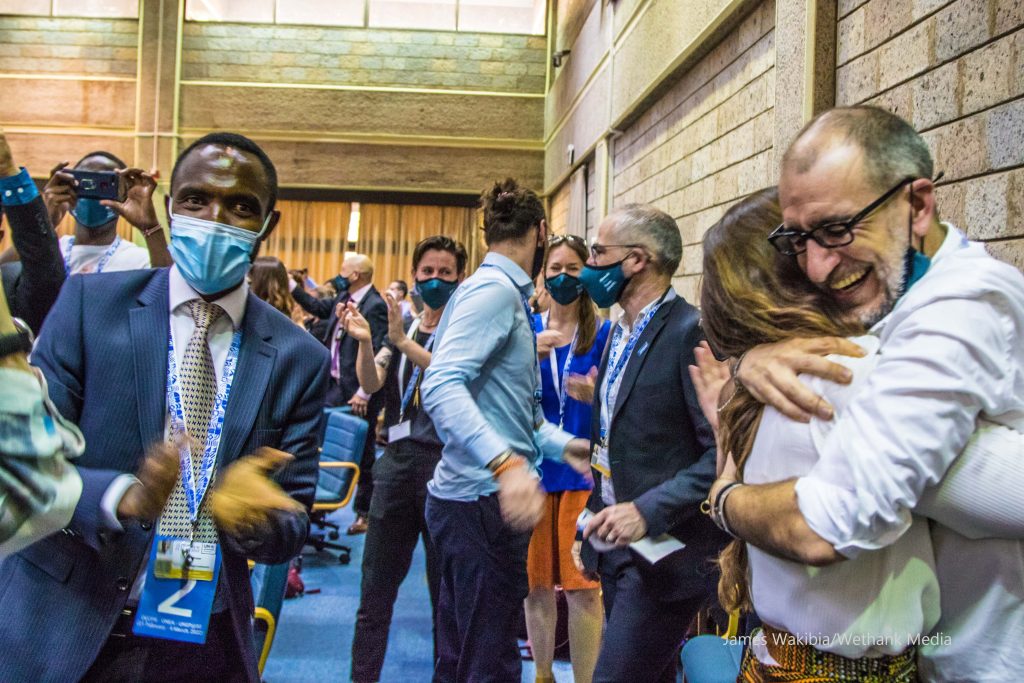
Claire Arkin
We need to change the system. We can’t just continue to have bandaid solutions and so Zero Waste really invites that kind of systemic change that both looks into the downstream solutions as well as the upstream solutions.
Brooke
The negotiations for a global plastics treaty can now cover the impacts of plastic pollution across the full lifecycle of the material, from production, to consumption and disposal. This could also benefit the climate, as plastics contribute a substantial amount of greenhouse gasses. According to the EU environmental commissioner, reducing fossil-fuel based plastics will be crucial to decarbonize the economy.
Those who will draft the treaty are also tasked with considering human-rights related aspects such as human health and well-being, indigenous knowledge and the role and interests of the millions of waste pickers who make an income from plastic trash. And the agreement won’t be voluntary, but is planned to be legally binding.
It feels like we are on the brink of movement for systemic change. Of course, the negotiations on the treaty have just begun, and it could still be watered down. Plastics production and consumption are still on the rise, and there will be lots of struggles around the final wording of the pact. But it’s a promising and ambitious start. Will the new plastics treaty help curb the impacts of plastic pollution on the planet? Let’s hope it will, as soon as possible.
Music – Plastisphere Theme by Dorian Roy
Anja
This was the Plastisphere with Brooke Bauman. You listened to an updated version of episode 3 of Brooke’s podcast, Guilty Plastics. It was originally released in 2019 under the title “Global Waste Trade”.
Brooke
Anja and I revised the episode together to include the latest developments. We’d like to thank Kevin Fisher, Alexis McGivern, Claire Arkin, Nils Simon, Karen Raubenheimer, and Baldeep Kaur for helping us understand this topic.
Anja
The soundtrack was by Blue Dot Sessions. Thanks to Galen and all the musicians at Blue Dot for their amazing tracks, which you can find at sessions.blue. Cover art is by Maren von Stockhausen, theme music by Dorian Roy. Huge thanks to all our patrons and friends who support the show.
Brooke
And of course, thank you for listening to this podcast! We’re so grateful you’re along for the journey. See you next time, bye-bye!
***
Photo series
James Wakibia is an activist and photo-journalist from Nakuru, Kenya. Driven by environmental destruction in his hometown, where forest was cut down, trash piled up, and waste spilled into a lake next to a natural reserve, James became an environmentalist. He started to focus on the issue of plastic pollution, and is credited for starting the campaign that led to the ban of plastic bags in Kenya – one of the strongest legislations on bags in the world. You can follow James on Twitter @jameswakibia, he blogs on Instagram and Medium, and photography by him is available at Getty and Sopa images. Thanks to the photographer for kindly donating the images above for this article.
